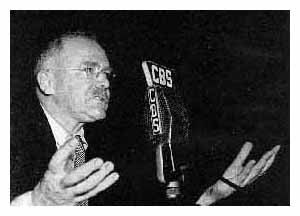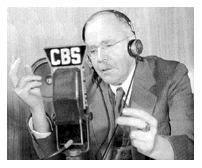
H. V. Kaltenborn
Hans von Kaltenborn’s radio career goes back to April 21, 1921 when he addressed the Brooklyn Chamber of Commerce while speaking from Newark, N.J. Two years later he was regularly heard on the air. He joined CBS in 1928.When he was nineteen, he ran off from home and joined up to fight in the Spanish-American War. After that he spent some time in Europe, returning to take a job with the Brooklyn Daily Eagle. However, at twenty-four, he went to college enrolling as a special student at Harvard. When he finished, he returned to the Eagle, but would travel in the summertime to distant locales.
Kaltenborn was known as a commentator who never read from a script. His “talks” were extemporaneous, created from notes he had previously written. His analysis was welcomed into homes especially during the war and the time leading up to America’s entry into it.
He had an international reputation and was able to speak intelligently about events because he had interviewed many of those involved. From the contacts he developed in his travels and his ability to speak fluent German and French, Kaltenborn seemed chosen for the role he developed at CBS.

One of his most famous periods was during the Munich crisis in 1938. Much of what listeners heard was Kaltenborn speaking without scripts even after sometimes having been up for most of a night covering the breaking news. Some claimed that when Kaltenborn was awakened during the Munich vigil, one merely had to utter “Munich” and Kaltenborn could talk for hours on the subject.
Kaltenborn had very specific views about radio’s role in presenting the news. Later in life he wrote on the subject through many of his books.
While he was precise in what he reported on the air, Kaltenborn wasn’t always right. On Election Night in 1948, he was presenting the latest Presidential election returns between President Harry S Truman and challenger Thomas E. Dewey. Throughout the evening, the returns were too close to call. As the evening progressed, Kaltenborn could see a swing in Dewey’s favor. It was enough for him to project Dewey the winner, despite the returns were still close. What Kaltenborn didn’t foresee was another swing in the votes going to Truman. As evening turned to early morning, Kaltenborn retracted his original projection and announced Truman as the winner. On his newscast, Kaltenborn described how Truman did an impersonation of the journalist describing how he (Truman) was losing the election. Kaltenborn took the President’s comments with class as he stated, “We can all be human with Truman. Beware of that man in power who has no sense of humor.” Kaltenborn laughed at himself as everyone else laughed with him.
Photo credit: The Columbia Broadcasting System
Listen to a portion of Mr. Kaltenborn’s news broadcast of August 14, 1945
in which he announces the Japanese surrender and the end of World War II.